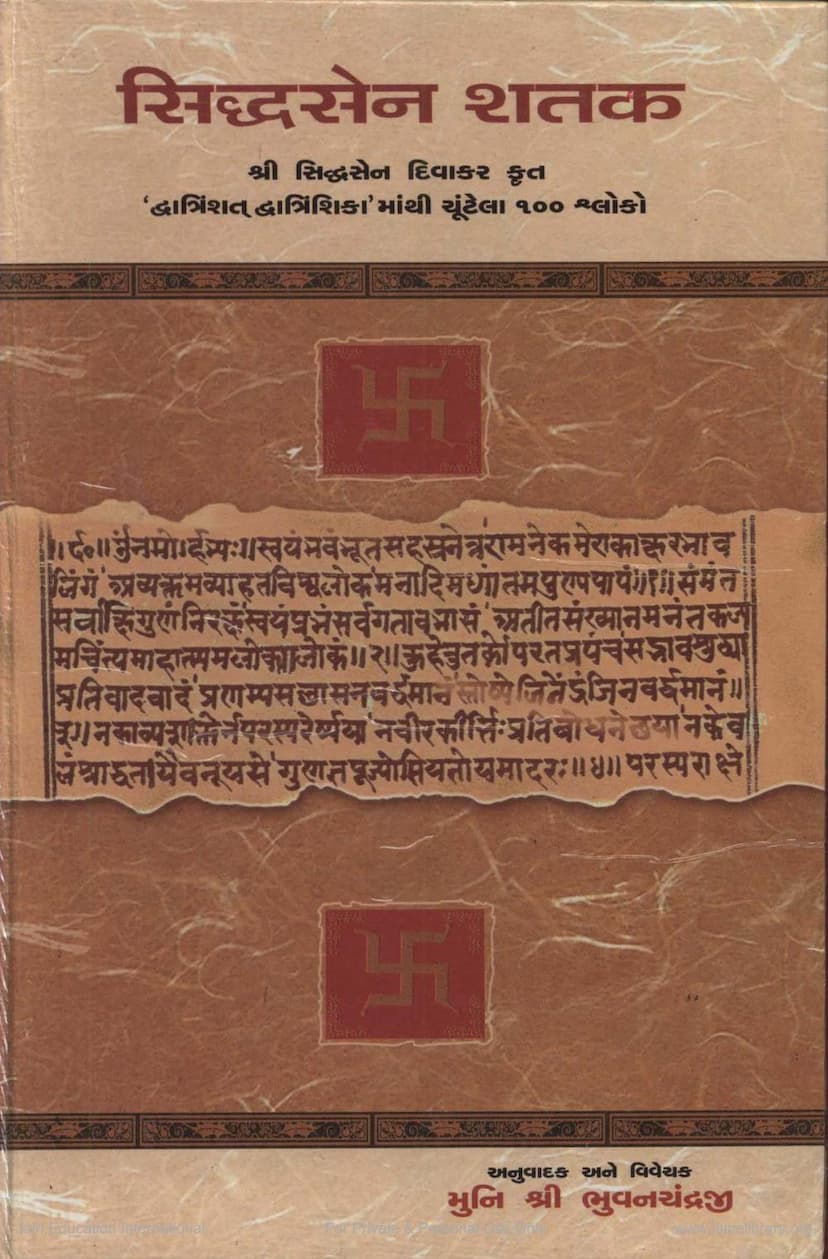Siddhsen Shatak
Added to library: September 2, 2025

Summary
The book "Siddhasen Shataka" is a collection of 100 selected verses from the "Dwatrinshat Dwatrinshika" (also known as "Battis Battisi") by the renowned Jain philosopher and logician, Acharya Siddhasen Divakar. The verses, chosen for their philosophical depth and relevance, are presented with a Gujarati translation and commentary by Muni Bhuvanchandraji.
The compilation aims to make the profound and multifaceted thoughts of Acharya Siddhasen Divakar accessible to a wider audience, particularly those unfamiliar with Sanskrit and complex philosophical texts.
Key aspects and themes covered in the book, based on the provided pages:
- Author and Text: The primary author of the original verses is Acharya Siddhasen Divakar, a significant figure in Jain philosophy, believed to have lived around the 4th century CE. Muni Bhuvanchandraji serves as the translator and commentator.
- Source Text: The verses are drawn from Siddhasen Suri's "Dwatrinshat Dwatrinshika," a collection of 32 sets of 32 verses each, covering a wide array of topics related to Jain philosophy, ethics, and the teachings of Lord Mahavir.
- Siddhasen Divakar's Significance: The book highlights Siddhasen Divakar's immense contribution to Jainism. He is described as a great logician, philosopher, poet, and a strong proponent of intellectual inquiry. His moniker "Divakar" (meaning sun) signifies his role in illuminating the path of knowledge. Despite his profound intellect and rigorous logic, the commentary suggests a deep devotional core and a compassionate approach to conveying spiritual truths.
- Philosophical Scope: The verses and commentary touch upon various philosophical concepts, including:
- The nature of reality: Exploring ideas of substance, qualities, and modes of existence (dravya, guna, paryaaya).
- Causality: Discussing the principles of production, destruction, and permanence (utpaada-vyaya-dhrauvya).
- The critique of other philosophical schools: Analyzing and sometimes contrasting Jain views with those of other contemporary Indian philosophies (e.g., Sankhya, Vaisheshika, Buddhism, Vedic traditions).
- The concept of soul and liberation: Discussing the path to spiritual freedom (moksha).
- The importance of both knowledge and action: Emphasizing that mere intellectual understanding without righteous conduct is insufficient, and vice-versa.
- The nature of suffering and its causes: Identifying attachment, aversion, and ignorance as roots of suffering.
- The significance of non-absolutism (Anekantavada): Presenting multiple perspectives on reality and advocating for a balanced, nuanced approach to truth.
- The role of discipline and conduct: Discussing the importance of self-control, ethical behavior, and the nuances of monastic discipline.
- The true meaning of renunciation: Differentiating between outward asceticism and inner detachment.
- The correct approach to scriptures and traditions: Encouraging critical inquiry rather than blind adherence.
- The nature of perfect knowledge and omniscience (Kevala Jnana vs. Sarvajnatva): Delving into the philosophical definitions and implications.
- The importance of the guru-disciple relationship: Outlining the qualities of a true spiritual guide and the responsibilities of a disciple.
- Critique of Dogmatism: A significant theme is Siddhasen Divakar's critique of rigid, one-sided viewpoints (ekantavada) and blind adherence to tradition without proper inquiry. He champions the power of logic, reason, and compassionate dialogue.
- Muni Bhuvanchandra's Contribution: Muni Bhuvanchandraji's commentary is praised for its clarity, scholarly depth, and ability to present complex ideas in an accessible manner. He strives to connect Siddhasen's ancient wisdom to contemporary life and thought, presenting Siddhasen not just as a logician but also as a poet and a profound thinker. The commentary also includes details about Siddhasen Divakar's life and historical context, drawing from various traditional accounts.
- Publisher: The book is published by Jain Sahitya Academy, Gandhidham (Kutch), Gujarat, indicating its focus on promoting Jain literature.
In essence, "Siddhasen Shataka" offers a curated glimpse into the rich philosophical landscape created by Acharya Siddhasen Divakar, making his profound insights available through Muni Bhuvanchandraji's insightful commentary and translation. It serves as a valuable resource for understanding key tenets of Jain philosophy and the intellectual prowess of one of its most esteemed exponents.